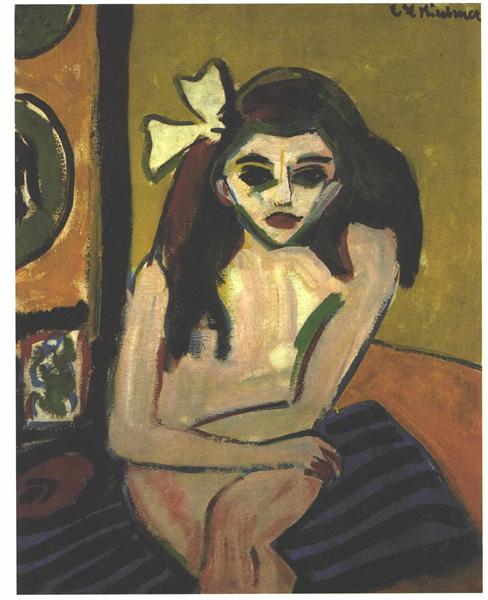Description
The work "Marcella" by Ernst Ludwig Kirchner, created in 1910, is a significant example of German expressionism, an artistic movement that Kirchner helped to define. This painting reflects both its aesthetic and social concerns, and a living testimony of the complexity and the vibrant energy of its time can be considered. In "Marcella", Kirchner captures a woman portrayed with a characteristic style of bold strokes and vibrant colors. The central figure, which seems to be a young woman, is presented in a confident pose, with an expression that evokes both intimacy and distance, suggesting the duality of the human being.
The composition is dynamic and the use of color is particularly remarkable. Kirchner uses a palette that covers intense and contrasting tones, where red and green predominate, generating a visual tension that catches the viewer's gaze. This chromatic choice not only serves to accentuate Marcella's figure, but also establishes an environment that permeates the work with an almost palpable sensuality. The application of the paint, which seems to be fastened and gestural, confers an almost three -dimensional quality to the work, as if the figure were leaving the canvas.
At the composition level, Marcella's figure occupies a central place, which highlights its importance and gives it a fundamental role within the visual narrative. Its facial features are stylized, which is characteristic of expressionism, where exact representation yields to a more subjective interpretation. Kirchner, like other artists of his time, explored the individuality and psychology of his model through the deliberate deformation of shapes and colors.
This work not only reflects Kirchner's technical mastery, but also its fascination with urban modernity and life. Being part of a period where women began to occupy a more visible space in the social sphere, "Marcella" can also be understood as a comment on the role of women in contemporary society of the early twentieth century. The painting thus becomes a vehicle that allows exploring tensions between individual authenticity and social pressures, a recurring theme in Kirchner's work.
In his artistic career, Kirchner was influenced by various currents, including Fauvism and primitive art, which is also reflected in this work. "Marcella" can be placed within a broader context when considering their other creations, where their female characters are usually in the center of narratives that explore identity, alienation and modernity. Through his work, Kirchner invites reflection on contemporary life and human experience, using painting not only as an aesthetic means, but as a critical tool.
In summary, "Marcella" is a remarkable achievement of Ernst Ludwig Kirchner that not only captures the essence of expressionism, but also invites the viewer to immerse himself in the complexities of modern life and individual experience. Through its vibrant palette, its dynamic composition and its ability to evoke emotions, Kirchner transforms the everyday art, establishing a bridge between the spectator and the deep psyche of his time.
KUADROS ©, a famous paint on your wall.
Hand-made oil painting reproductions, with the quality of professional artists and the distinctive seal of KUADROS ©.
Art reproduction service with satisfaction guarantee. If you are not completely satisfied with the replica of your painting, we refund your money 100%.

